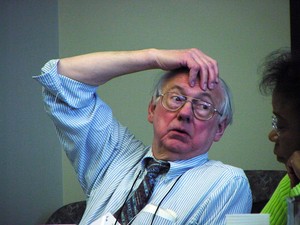As the United Nations prepares to celebrate its 70th anniversary, a long-serving Presbyterian minister reflects on his nearly 30 years of service in New York. The Rev. Robert F. Smylie served the church at the UN from 1975 until his retirement in 2002.
A graduate of Washington University in St. Louis and Princeton Theological Seminary, Smylie followed five generations of clergy and two older brothers into the ministry. But Smylie felt his calling was not in the pulpit, but in international affairs. Following service as a Navy chaplain, the National Council of Churches and the University of Florida, Smylie took the role that would define his ministry and change his life.
In 1975, Smylie was called to become the associate for Peace and International Affairs for the United Presbyterian Church in the U.S.A. and was based in the upper west side of Manhattan. He said the word “peace” was added to his title. “I asked why they were changing the name and the response was ‘peace’ had become a dirty word and it was time to reclaim it and that’s what we set out to try and do.”
“There was no ministry of the church physically based near the UN. In fact, engaging with the UN was just one of my many responsibilities,” said Smylie. “Over the years, I went regularly to meetings with other protestant and interfaith groups to participate in the processes of the religious community, trying to support the UN on one hand and communicating issues back to the church.”
Between 1975 and 1983, he would commute from 475 Riverside Drive to the UN whenever there was a reason to be present. During the transition of the reunited Presbyterian Church (U.S.A.) to its Louisville offices, Smylie made the pitch to maintain a presence in the UN community.
“I argued that if the church wanted to continue doing work at the UN, there had to be an office in the city. It couldn’t be done from Louisville or anywhere else,” Smylie said. “The church committee working on the merger agreed. At that point we opened an office near the UN at the Church Center. Methodist Women, an organization within the Methodist Church, had acquired the building to be a center for Protestant groups working at the UN. I was privileged to remain behind.”
Smylie said he never tired of his work at the UN, adding there was always a new challenge, an opportunity to learn and grow. Over the years, he served within the UN community in a number of ways, including a national advisory role on the U.S. Committee for UNICEF and the United Nations Association.
“It was an incredible learning experience. There were substantive challenges over the years including Israel/Palestine, South Africa, and relations with Cuba, the Soviet Union and the Far East. All of these kept coming up time and time again,” he said. “There was the UN Declaration of Human Rights which spawned approximately 100 different declarations and issues of international law.”
Ten years after his retirement, Smylie was honored by the PC(USA) as director emeritus of the Presbyterian Ministry at the United Nations.
Looking at the current state of global affairs, Smylie says there have been rumblings about the UN’s relevance and whether it has served its purpose.
“All major countries at some point downplay the work of the United Nations. Countries like our own have ignored the UN’s recommendations and believe it is only good now for making speeches,” he said. “When times get tough and no one knows what to do, that’s when they go to the UN. How long will it last? I don’t want to speculate. But I am convinced that if the world is going to survive, we need to either strengthen the UN or create an organization that does what the UN was intended to do with the resources and backing to do the job.”
For more information about the Presbyterian Ministry at the United Nations and its current work and seminars, check out the ministry website.

